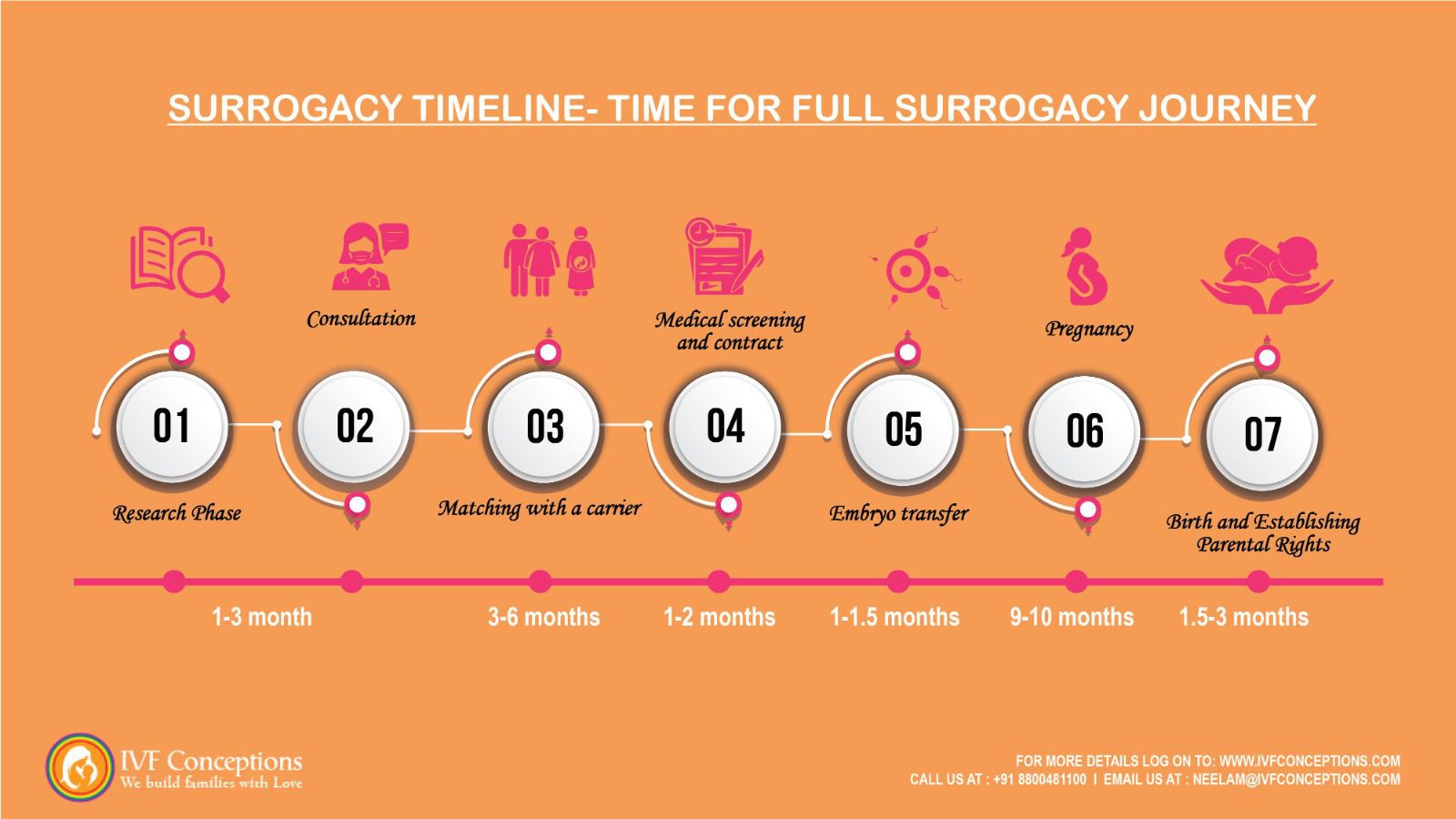Surrogacy In Alabama- What you need to know

Surrogacy in Alabama is a legal arrangement in which a woman carries and gives birth to a child on behalf of the intended parents. This procedure assists couples and individuals in overcoming fertility issues, physical disorders, or other factors that prevent them from becoming pregnant. Alabama has embraced surrogacy as a way to empower families and form lifelong relationships.
Beginning the journey of motherhood may be a thrilling and rewarding experience. Surrogacy in Alabama is an excellent option for couples who are having difficulty conceiving naturally.
Surrogacy has grown in popularity in Alabama as a viable option for individuals and couples looking to expand their families.
Surrogacy in Alabama is available to same-sex couples and LGBT+ individuals who match the eligibility standards of their surrogacy experts.
To generate an embryo for gestational surrogacy, they may need to collaborate with an egg or sperm donor. They can also secure their parental rights by obtaining a pre-birth or post-birth order.
Get in touch for a Free Surrogacy Consultancy:
📲 +91-8800481100 ( WhatsApp, Line, Viber)
 Key Highlights of Surrogacy in Alabama
Key Highlights of Surrogacy in Alabama
Surrogacy in Alabama provides a path to motherhood for those experiencing fertility issues, as well as a supportive legal framework and a variety of benefits. Here are some crucial points to consider:
- Legal Protection: Surrogacy laws in Alabama enforce surrogacy agreements, ensuring that all parties rights and duties are recognized and safeguarded.
- Surrogacy in Alabama is open to all individuals and couples, regardless of sexual orientation, making it an inclusive choice for expanding families. Parenthood is a global dream that has no bounds, and surrogacy in Alabama allows same-sex couples and LGBTQ+ people to realize that dream. With its evolving legal landscape and diversified culture, Alabama provides an opportunity for these families to grow through surrogacy.
- Gestational Surrogacy: The most common type of surrogacy in Alabama is gestational surrogacy, in which an embryo is generated through in vitro fertilization (IVF), providing genetic ties to the intended parents.
- Surrogacy organizations in Alabama: Skilled surrogacy organizations in Alabama handle all aspects of the procedure, from pairing intended parents with surrogates to providing legal, medical, and emotional assistance.
- Initial consultations, medical and psychological examinations, legal agreements, fertility treatments, pregnancy, and post-birth procedures are all part of the surrogacy process.
- Surrogacy charges vary in Alabama but commonly range from $110,000 to $200,000.
- Best Interests of the Child: In surrogacy arrangements, Alabama courts emphasize the child’s well-being and future, ensuring their rights are protected.
An Overview of Surrogacy in Alabama

Surrogacy has recently become a feasible option for couples and people looking to expand their households. Alabama, with its distinct legal and cultural backdrop, poses a unique set of issues for individuals considering surrogacy.
This article delves into the topic of surrogacy in Alabama, covering legal issues, the surrogacy procedure, and important points to consider. This guide will provide you with vital insights into navigating the surrogacy experience, whether you are an intended parent or a possible surrogate.
The surrogacy process is divided into various stages, beginning with the choice of a surrogate or intended parents. Following this, legal agreements, medical procedures, and continuing assistance are provided throughout the pregnancy. To achieve a smooth experience, the surrogate, intended parents, medical specialists, and legal experts must work together.
A surrogate is not the biological mother of the child she carries when using gestational surrogacy in Alabama. In vitro, fertilization is used to develop an embryo from the intended mother’s egg and the intended father’s sperm, which is then transferred to the surrogate.
Many states, including Alabama, allow this type of surrogacy. A surrogacy agency in Alabama will assist you in navigating this type of surrogacy journey and will connect you with a surrogacy lawyer to guarantee that your surrogacy is entirely legal.
Surrogacy laws in Alabama
While there are several different state-established surrogacy laws in the United States, Alabama has none. However, this does not exclude you from choosing this road as a prospective parent or surrogate in a safe and successful manner.
Working with surrogacy professionals will help you negotiate the absence of Alabama surrogacy laws. Everyone engaged in your surrogacy journey will be safeguarded and advocated for as a result. Contact a surrogacy attorney if you have legal concerns with surrogacy or if you have any questions regarding surrogacy law in Alabama.
 Is Surrogacy Legal in Alabama?
Is Surrogacy Legal in Alabama?
Surrogacy is legal in Alabama. There are no surrogacy regulations in Alabama that limit the practice; hence, it is legal. To ensure that your and your surrogacy partner’s rights are protected, you’ll need to consult with an expert surrogacy attorney who will walk you through the proper court proceedings.
Is Compensated Surrogacy Possible and Legal in Alabama?
Yes, compensated surrogacy is possible and legal in Alabama. There is no Alabama surrogacy legislation that limits the amount of base remuneration a surrogate can get; thus, this is something that is agreed upon between surrogates and intended parents in the surrogacy contract.
Compensation for surrogates is sometimes used to offset the medical risks they accept, the money they miss out on at work, surrogacy-related travel expenditures, pregnancy- and surrogacy-related costs, and other expenses; therefore, the amount can vary depending on those factors.
Is Traditional Surrogacy Legal In Alabama?
Depending on their circumstances, some intended parents prefer traditional surrogacy, while others opt for gestational surrogacy. Although it is frequently suggested against owing to potential emotional and legal dangers, traditional surrogacy is not illegal in Alabama. To determine if this is the best course of action for you, you should talk further with your surrogacy agency in Alabama.
Can Same-Sex Couples Choose Surrogacy?
Currently, there are no regulations that forbid or have an impact on intended parents of the same sex. In Alabama, same-sex surrogacy is permitted.
Surrogacy in Alabama is a beacon of hope for same-sex couples and LGBTQ+ people who want to start a family of their own. The idea of parenthood becomes a reality through meticulous planning, legal competence, and the support of a loving society, and families are established with pride.
The same Alabama surrogacy regulations apply to LGBTQ+ intended parents as they do to heteronormative intended parents. You can add this information to your surrogate or intended parent profile, which may help you find a match that is advantageous to both sides.
Your Surrogacy Contract In Alabama
Even though there are no surrogacy rules dictating how contracts must be signed, an Alabama surrogacy legal contract is required for everyone’s protection. Surrogacy contracts are critical in shaping the surrogacy experience since they provide legal protection and outline the rights and duties of all parties involved.
A well-drafted surrogacy contract is required in Alabama to ensure that the procedure is seamless and transparent for intended parents, surrogate moms, and any other individuals or entities involved. Legal parenthood must be established as part of the surrogacy process.
Even if they are genetically related to the child, prospective parents in Alabama may need to seek a court order to establish their legal rights as parents. Surrogacy contracts in Alabama provide a road map for all parties involved in the surrogacy journey, outlining their rights, responsibilities, and expectations.
These contracts provide legal protection and transparency, guaranteeing that the procedure is carried out in an ethical and professional manner. Surrogacy contracts play a key role in molding the future of family-building through this transformative method as surrogacy continues to advance.
Surrogacy contracts are drafted by surrogacy attorneys (one for the intended parents and one for the surrogate). If the surrogate is married, her spouse is normally required to attend in order to officially affirm that he is not the biological father of the children the surrogate carries for the intended parents.
Legal Parentage In Alabama
- The procedure for establishing legal parenthood in a surrogacy arrangement varies depending on the unique circumstances, but your Alabama surrogacy attorney can assist you through the steps you need to take.
- Unmarried couples in Alabama are unlikely to be granted a pre-birth parentage order. So, in order to affirm the legal parental rights of unmarried intending parents, a post-birth adoption must be completed.
Additional guides for surrogacy in the USA:
Surrogacy In the USA is Made Easy and Affordable.
How Much do Surrogacy Agencies Charge in the USA?
How Much Does Surrogacy Cost in the USA ( 2024)?
Why USA Couples Should Do Surrogacy In Georgia, Europe?
Surrogacy Financing Options For Intended Parents
Why Surrogacy Costs So High And How To Manage It?

How Much Does Surrogacy Cost In Alabama?
Surrogacy in Alabama typically costs between $110,000 and $200,000. This range is determined by a variety of factors, including the kind of surrogacy you select, the fertility clinic with which you work, the surrogate mother with whom you match, the legal expenses you pay, and any unanticipated issues or additional services that may occur along the way.
Main expenses that make the total cost of surrogacy in Alabama
| EXPENSES | COST |
| Agency fees: This is the price paid to a surrogacy agency, to assist you in finding a suitable surrogate mother. Agency costs might vary depending on the agency’s quality of service and experience. | They normally range between $25,000 and $40,000 |
| Surrogate compensation: This is the fee you pay your surrogate mother in exchange for her time, work, and sacrifice in bearing your child. Surrogate pay varies according to the surrogate’s experience, location, preferences, and agreement with you. | It normally ranges from:$45,000 to $85,000 |
| Surrogate Expenses: costs incurred by your surrogate mother during her pregnancy and subsequent recovery. Medical co-pays and deductibles, maternity apparel, travel fees, daycare, cleaning, lost wages, and so on are examples of surrogate expenses. | Surrogate expenses can range from $20,000 to $45,000 |
| Egg Donation Fee: The fee you pay to an egg donor if you need to use donor eggs for surrogacy. The charge for egg donation varies depending on the egg donor’s experience, location, preferences, and agreement with you. Additional costs for milestones such as screening tests, medicine injections, egg retrieval, and so on may be included in the egg donation charge | which usually ranges from $20,000 to $30,000 |
Individual variable costs
These expenses are not related to agency fees, but they should be considered when budgeting for surrogacy. These expenditures may include doctor’s visits, fertility clinics, outside legal counsel, travel, and other fees incurred during your surrogacy journey.
VARIABLE COSTS THAT ARE COMMON:
- Breast milk obtained through surrogacy
- Traveling with the intended parent
- Expenses for a newborn
- Fees for IVF
- Outside counsel for the intended parent
Surrogacy in Alabama For Intended Parents
 Surrogacy in Alabama provides a ray of hope and the possibility to realize motherhood goals for couples and people who are trying to conceive normally.
Surrogacy in Alabama provides a ray of hope and the possibility to realize motherhood goals for couples and people who are trying to conceive normally.
Alabama, located in the heart of the South, offers a unique terrain for surrogacy, where legal issues, emotional aspects, and the journey itself interact to provide a road toward bringing a child into your family.
Surrogacy arrangements in Alabama are governed by certain legal statutes. Pre-birth orders are frequently sought in order to establish the intended parents’ legal rights before the child is born.
These legal concerns provide a solid platform for the intended parents to confidently embark on their journey.
Choosing the correct surrogate is a critical step. Alabama surrogacy agencies serve an important role in uniting intended parents with surrogates who share their values and ambitions. These organizations facilitate the entire process, ensuring that both sides are happy with the agreement and that their expectations are in sync.

Surrogacy Process in Alabama
Although there are no state surrogacy regulations in Alabama, surrogacy is still an option for hopeful parents and possible surrogates who wish to help others complete their families.
Many Alabama families are considering surrogacy as a means of expanding their households. We’re here to assist you in sorting through the facts and expanding your loving family.
Completing a screening process
For Intended parents,
A home assessment and background clearances for you and any persons over the age of 12 living in your home are part of the intended parent screening procedure.
For Surrogate
Surrogates must meet certain requirements, including a medical evaluation, an in-home assessment, a mental health evaluation, and a background check, as part of the screening process.
Surrogacy screening in Alabama can finally determine if surrogacy is best for you. You can find out if this is a suitable fit through a series of questions and background checks.
1. Match Finding
For Intended Parents
You will work with your surrogacy professional to discuss your goals and preferences in order to find a surrogate match. Create a profile with photos and information to help a prospective surrogate get to know you. Once you’ve decided on a surrogate, a surrogacy professional will arrange for a meeting or phone conversation to get to know each other better.
For surrogate
You will be able to choose the type of parents you want to work with, and your surrogacy agency will assist you in finding families who meet your requirements. You can search for intended parents based on ethnicity, religion, age, personality, and other factors. Your surrogacy professional will assist you in finding a family with whom you wish to work and getting to know them more as you make your decision.
Finding a match is an exciting part of the Alabama surrogacy process. A surrogacy professional will assist you in developing your surrogacy plans, creating a profile, and sharing it with other surrogate seekers.
2. Legal Formalities
For Intended Parents
Your lawyer will meet with you to discuss your legal rights, potential dangers, and compensation. After signing the contract, you will be able to proceed with your surrogacy journey.
For Surrogate
Your attorney will review the contract with you to ensure that it meets your requirements. This contract will cover everything from compensation to potential dangers. After you sign it, you can proceed with the surrogacy process and begin collecting the agreed-upon monthly allowance.
3. Medical Processes and the Transfer of Embryos
For Intended Parents
You will pick whether you will use your own egg or an egg donor. The egg will be harvested, fertilized with sperm from the intended father or donor, incubated, and evaluated for development. The embryo will next be implanted into the surrogate mother.
For Surrogate
Prior to the transfer, you will most likely be offered fertility drugs to prepare your body for the embryo transfer. The medical procedure for transfer and implantation is relatively simple and painless, requiring no medication or anesthesia.
You will most likely be in the clinic for a few hours following the procedure, and you will need to relax for a few days afterward. You will return to the clinic a few weeks later for a pregnancy test to confirm the pregnancy.
The gestational surrogacy process in Alabama includes the development of an embryo via IVF. The embryo is generated utilizing the intending parents and/or a donor’s genetic material. The embryo is then put in the surrogate’s uterus.
4. Pregnancy and Baby’s Arrival
For Intended Parents
You will always be allowed to witness the birth of your child in the delivery room as the intended parents. You are getting close to finishing the Alabama surrogacy procedure; therefore, this is an exciting time. You can take your new bundle of joy home once everyone has been cleared for discharge from the hospital and has been proven to be healthy.
For Surrogate
Pregnancy is a time to take care of yourself, see the doctor, and psychologically get ready for the gift you are giving this family. You will stay in the hospital after giving birth to rest and make sure you’re okay. After that, you will be let go with the knowledge that you contributed to someone receiving the gift of family and parenthood.
Finding a Surrogate Mother in Alabama

In order to find a surrogate mother, first decide how you want to find one. There are several ways to find one, some of which are mentioned below:
1. Through Surrogacy Agencies
Surrogacy agencies are firms that specialize in making surrogacy arrangements. They have databases of potential surrogate moms who have been thoroughly screened. Intended parents can work with these organizations to find a surrogate mother who matches their choices and values.
2. Independent Networking
Some prospective parents desire to be more self-sufficient through networking within their communities or through online platforms. Surrogacy-specific social media groups, forums, and websites can help you connect with potential surrogate mothers. This strategy, however, may necessitate more effort in terms of screening and legal procedures.
3. Surrogacy with a Family Member or a Friend
Surrogacy with a family member or acquaintance provides a special level of trust and familiarity. The existing link can serve as a solid platform for collaboration throughout the surrogacy process, encouraging open communication and common goals.
Friends, family members, and fertility professionals can also refer you to a prospective surrogate mother. Personal recommendations can create a sense of confidence and credibility because they are generally made by people who have firsthand experience with the surrogacy procedure
4. Fertility Clinics
Surrogate moms may be available in fertility clinics that offer assisted reproductive technologies. These clinics can assist intended parents by matching them with surrogates who have already been medically evaluated and are experienced with the procedure.
You may always turn to your surrogacy expert for further information on matching with possible surrogates and finding the best match for you and your surrogacy goals.
FAQs for Surrogacy in Alabama

Q1. What is the process of surrogacy in the USA for intended parents?
Ans. The surrogacy process in Alabama for intended parents involves multiple steps, starting with a consultation to discuss your story and questions. Working with an experienced agency Surrogacy provides guidance through milestones like choosing an agency, finding a surrogate, medical screening, and legal contracts.
Q2. How much does surrogacy in the USA cost?
Ans. The cost of surrogacy in the USA varies depending on the program you choose. The cost of surrogacy starts at $150,000 to $200,000 based on the specific services needed and the compensation of the surrogate mother and egg donor. For low-cost surrogacy, it is advised to consider “independent surrogacy or private surrogacy”, which costs less but requires more time and management.
Q3. What are some affordable surrogacy options?
Ans. Affordable surrogacy options are:
- Opting for independent surrogacy arrangements.
- Using a surrogate mother within the family or friend circle.
- Considering the international surrogacy countries with affordable, low-cost surrogacy programs like Mexico, Colombia, Argentina, Georgia, and Ukraine.
Q4. What are the requirements for becoming a surrogate mother in the USA?
Ans. The requirements for becoming a surrogate mother are:
- To become a surrogate mother, you must meet certain criteria.
- You should have delivered a child of your own and be parenting at least one child.
- Uncomplicated pregnancies and deliveries are necessary, as documented by medical records.
- Age requirements are between 21 and 44 years old.
- The Body Mass Index (BMI) is typically not higher than 33.
- Surrogates should be citizens, legal residents, or legal immigrants of the United States.
- medically and psychologically in sound condition.
Q5. Can you help us find a low-cost surrogate mother?
Ans. Yes, we have been working in the international surrogacy domain for 13 years and have good networks of fertility clinics and surrogacy agencies globally, that are trusted to offer world-class services. We have long expertise and experience in the best and most legal international surrogacy countries. Get in touch for a free consultation.
Conclusion
Alabama surrogacy is a journey of hope, compassion, and teamwork. With careful planning, legal advice, and the assistance of skilled specialists, intended parents and surrogate mothers can confidently traverse this transforming process. Alabama’s hospitable society and legal framework give a solid basis for founding families and making lifelong bonds.
If you’d like to learn more about IVF, Egg Donation, or surrogacy services globally, check out the rest of our website at IVF Conceptions. We offer legally secure and affordable surrogacy consulting services for FREE.
Get in touch for a Free Surrogacy Consultancy:
📲 +91-8800481100 ( WhatsApp, Line, Viber)

 Key Highlights of Surrogacy in Alabama
Key Highlights of Surrogacy in Alabama Is Surrogacy Legal in Alabama?
Is Surrogacy Legal in Alabama?